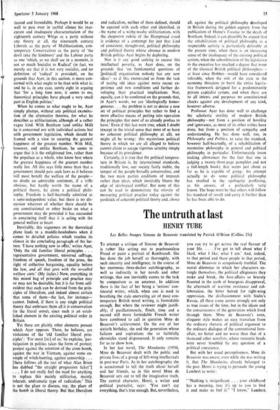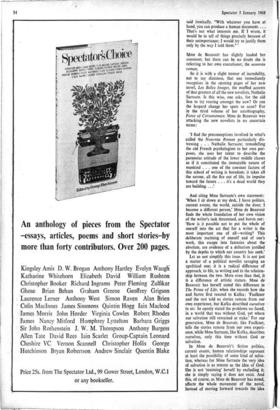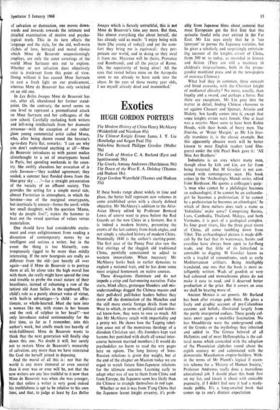The untruth at last
HENRY TUBE
Les Belles Images Simone de Beauvoir translated by Patrick O'Brian (Collins 25s) To attempt a critique of Simone de Beauvoir is rather like setting out to psychoanalyse Freud or paint a portrait of Rembrandt. She has done the job herself so thoroughly, with such sincerity and intelligence, in the course of her enormous three-decker autobiography, as well as indirectly in her novels and other writings, that one inevitably comes to the task by comparison as an amateur. In addition there is the fact of her being a 'serious' con- tinental writer, which, when one is used to breathing the stale enervating air of most con- temporary British novel writing, is formidable enough. But where the reviewer might justifi- ably, if pusillanimously, flinch, time and a second still more formidable French writer have combined to call in question Mme de Beauvoir's achievement. On the eve of her sixtieth birthday, she and the generation whose failures and aspirations she so faithfully chronicles stand dispossessed. It only remains for us to show how.
In her last novel, The Mandarins (1954), Mme de Beauvoir dealt with the public and private lives of a group of left-wing intellectuals in post-war Paris. As in her autobiography she is accustomed to tell the truth about herself and her friends, so in this novel Mme de Beauvoir sets out to tell the imaginative truth. The central character, Henri, a writer and political journalist, says: 'You can't say everything, that's true enough. But, nevertheless, you can try to get across the real flavour of
your life. . . I've got to tell about what I - liked, what I like, what I am.' And, indeed, to that period and those people in that period, Mme de Beauvoir is scrupulously truthful. The moral dilemmas in which her characters en- tangle themselves, the political allegiances they make and break, the love-affairs so bravely flaunted in the teeth of bourgeois disapproval, the aftermath of wartime resistance and col- laboration, the bitter hatred for right-wing oppression, the disillusionment with Stalin's Russia, all these come across strongly not only as true issues of the time, but in the idiom and the consciousness of the generation which lived through them. Mme de Beauvoir's even, eloquent style makes an easy transition from the ordinary rhetoric of political argument to the ordinary dialogue of the conventional love- affair, no better and no worse than that of a thousand other novelists, whose romantic heads were never troubled by any question of a political conscience.
But with her usual perceptiveness, Mme de Beauvoir was aware, even while she was writing it, that The Mandarins already belonged to the past. Henri is trying to persuade the young Lambert to write:
"Nothing is insignificant . . . your childhood has a meaning, too; it's up to you to find it and make us feel it." "I know," Lambert, said ironically. "With whatever you have at hand, you can produce a human document.... That's not what interests me. If I wrote, it would be to tell of things precisely because of their unimportance; I would try to justify them only by the way I told them."' Mme de Beauvoir has slightly loaded her comment, but there can be no doubt she is referring to her own executioner, the nouveau roman.
So it is with a slight tremor of incredulity, not to say dizziness, that one immediately recognises in the opening pages of her new novel, Les Belles Images, the muffled accents of that greatest of all the new novelists, Nathalie Sarraute. Is this wise, one asks, for the old lion to try roaring amongst the new? Or can the leopard change her spots so soon? For in the third volume of her autobiography, Force of Circumstance, Mme de Beauvoir was attacking the new novelists in no uncertain terms: 'I find the preconceptions involved in what's called the Nouveau Roman particularly dis- tressing . . . Nathalie Sarraute; remodelling the old French psychologism to her own pur- poses, she uses her talent to describe the paranoiac attitude of the lower middle classes as if it constituted the immutable nature of mankind . . . one of the constant factors of this school of writing is boredom; it takes all the savour, all the fire out of life, its impulse toward the future . . . it's a dead world they are building. ...'
And citing Mme Sarraute's own statement: 'When I sit down at my desk, I leave politics, current events, the world, outside the door; I become a different person,' Mme de Beauvoir finds the whole foundation of her own vision of the writer's task threatened, and bursts out: `How is it possible not to put the whole of oneself into the act that for a writer is the most important one of all—writing? This deliberate maiming of oneself and of one's work, this escape into fantasies about the absolute, are evidence of a defeatism justified by the depths to which our country has sunk.'
Let us not simplify this issue. It is not just a matter of a political novelist savaging an apolitical one; it is a radical difference of approach, to life, to writing and to the relation- ship between the two. More even than that, it is a difference of artistic stature. Mme de Beauvoir has herself stated this difference in The Prime of Life, when she records how she and Sartre first reacted to Kafka: `Fatilkner and the rest told us stories remote from our own experience, but Kafka described ourselves to us: he openly stated the problems we faced, in a world that was without God, yet where our salvation still remained at stake.' For our generation, Mme de Beauvoir, like Faulkner, tells the stories remote from our own experi- ence, while Mme Sarraute, like Kafka, describes ourselves, only this time without God or salvation.
In Mme de Beauvoir's fiction politics, current events, human relationships represent at least the possibility of some kind of salva- tion, whereas for Mme Sarraute the very idea of salvation is as remote as the idea of God. She is not 'maiming' herself by excluding it she is simply saying it does not exist. And this, of course, as Mme de Beauvoir has noted, affects the whole movement of the novel. Instead of moving forward towards the idea
of salvation or damnation, one moves down- wards and inwards towards the intimate and detailed examination of motive and psycho- logical truth. This in its turn affects the_ language and the style, for the old, well-worn clichds of love, betrayal and moral choice which Mme de Beauvoir unquestioningly employs, are only the outer coverings of the world Mme Sarraute sets out to explore. Whether or not salvation does objectively exist is irrelevant from this point of view. Doing without it has caused Mme Sarraute to cast a fresh light on our predicament, whereas Mme de Beauvoir has only switched on an old one.
In Les Belles Images Mme de Beauvoir has not, after all, abandoned her former stand- point. On the contrary, the novel seems on one level to represent a premeditated attack on Mme Sarraute and her colleagues of the new school. Carefully excluding both writers and left-wing intellectuals from her dramatis personae—with the exception of one rather glum young commercial artist called Mona, who, after being shown round the heroine's up-to-date Paris flat, remarks: 'I can see why you don't understand anything at all'—Mme de Beauvoir introduces us with patent malice aforethought to a set of smartypants based in Paris, but spending weekends in the coun- try. She swiftly abandons her evocation of le style Sarraute—`they nodded agreement; they smiled, a summer heat flooded down from the blue-grey sky . . .'—for a straight presentation of the vacuity of an affluent society. This provides the setting for a simple moral tale, almost Forsterian in atmosphere, in which the heroine—one of the marginal smartypants, but inarticulaely uneasy—forms the anvil; while her small daughter, with the question 'Mama, why do people live?', makes the hammer to beat out the vexed question of values versus materialism.
One should have had considerable excite- ment and even enlightenment from reading a dissection of contemporaty mores by so intelligent and serious a writer, but in the event the thing is too blatantly, con- temptuously rigged to be more than mildly interesting. If the new bourgeois are really no different from the old just beastly all over again—and if Mme de Beauvoir is to portray them at all, let alone take the high moral line with them, she really might have spared the time and trouble to probe the exact nature of their beastliness, instead of exhuming a row of the tattiest old Aunt Sallies in the cupboard. The child's role as a purely abstract voice of virtue, with built-in advantages—`a child: so affec- tionate, so whole-hearted. Must she turn into a woman like me, with stones in her bosom and the reek of sulphur in her head?'—not only introduces naked sentimentality for the first time, so far as I remember, into this author's work, but smells much too heavily of wish-fulfilment. Mme de Beauvoir wants to think that the next generation will finally slap down this one. No doubt it will, but surely not to restore Mme de Beauvoir's monarchy of salvation, any more than we have reinstated the God she herself joined in deposing.
And the moral of all this is: not that the world is any more immoral or even amoral than it ever was or ever will be, not that the new writers are any less truthful to it now than Mme de Beauvoir was when she was younger, but that unless a writer is very good indeed his truthfulness is apt to be relative to his own time, and that, to judge at least by Les Belles
Images which is fiercely untruthful, this is not- Mme de Beauvoir's time any more. But then, like almost everything else about herself, she has already said as much: 'I enjoy being with them [the young of today]; and yet the com- fort they bring me is equivocal: they per- petuate our world, and in doing so they steal it from me. Mycenae will be theirs, Provence and Rembrandt, and all the piazze of Rome, Oh, the superiority of being alive! All the eyes that rested before mine on the Acropolis seem to me already to have sunk into the abyss. In the eyes of those twenty year olds, I see myself already dead and mummified.'




































 Previous page
Previous page